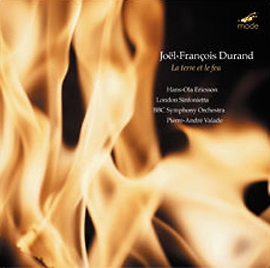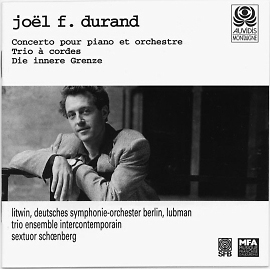Joël-François
Durand, composer
DISCOGRAPHY
|
Joël-François Durand, composer |
|

La Terre
et le Feu, for oboe and ensemble
Les
Raisons des Forces Mouvantes, for
organ
La Mesure
des Choses III. La Mesure de la Terre et du
Feu, for oboe and viola
Athanor,
for orchestra
BBC Symphony
Orchestra, London Sinfonietta, Pierre-André
Valade
Gareth Hulse,
oboe, Paul Silverthorne, viola
Hans-Ola
Ericsson, organ
Mode
Records
139; released September 2004

Concerto for
piano and orchestra
String
Trio
Die innere
Grenze, for string sextet
Stefan Litwin
(piano)
Deutsches
Symphonie-Orchester Berlin, Bradley
Lubman
Trio de
l'Ensemble Intercontemporain
Sextuor
Schoenberg
Naive
Montaigne
(Fra) Mo 782093 (Distribution: Harmonia Mundi);
released 1998
 |
La Terre et le Feu, for oboe and ensemble Les Raisons des Forces Mouvantes, for organ La Mesure des Choses III. La Mesure de la Terre et du Feu, for oboe and viola Athanor, for orchestra BBC Symphony Orchestra, London Sinfonietta, Pierre-André Valade Gareth Hulse, oboe, Paul Silverthorne, viola Hans-Ola Ericsson, organ Mode Records 139; released September 2004 |
|
 |
Concerto for piano and orchestra String Trio Die innere Grenze, for string sextet Stefan Litwin (piano) Deutsches Symphonie-Orchester Berlin, Bradley Lubman Trio de l'Ensemble Intercontemporain Sextuor Schoenberg Naive Montaigne (Fra) Mo 782093 (Distribution: Harmonia Mundi); released 1998 |
Press
Reviews
"The Concerto for piano and orchestra offers a rare richness of new information and inflections, and demonstrates a real architectonic care and an accute, "Schoenbergian," sense of form. (...) In "Die innere Grenze" for string sextet, the young French composer affirms a fantasy whose unexpected turns keep the auditors on their toes."
Le Monde de la Musique, December 1998
"The disc begins with one of the composer's most imposing pieces, the Concerto for piano and Orchestra.(...) Joël-François Durand assumes brilliantly the heritage of the genre, placing the traditional opposition of soloist-orchestra under the banner of a lively, playful, colourful and polymorphous modernity".
Diapason, November 1998
"From this disciple of Ferneyhough we hear a major talent, a perception doubtlessly reinforced through an uninterrupted reflection upon the heritage of western music. If for many this is his first exposure to the present composer, it's clearly under optimal conditions, with excellent interpreters."
Scherzo - No. 130 December 1998
"Durand was born in France in 1954, which, from were I sit, makes him a young man with what looks to be a bright future. (...) A kind of bravura unrest informs the piano concerto, string trio, and string sextet. Rather, however, than a socially relevant rage, the disturbances play (happily) as Gallic-cool: a succession of unanticipated intervallic leaps, harmonies, timbral mixes on an irregular rhtyhmic footing. Which is certainly not to remark an absence of quietude in the two pieces for strings especially."
La Folia - 1.5